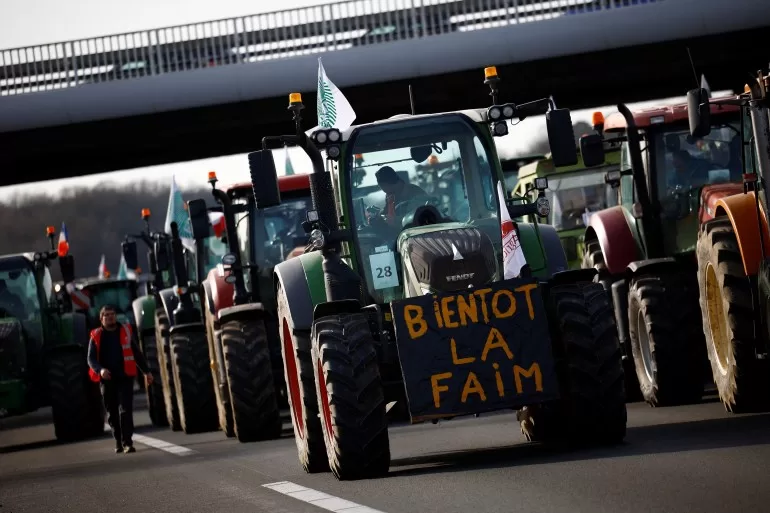Protesters are demanding better pay and fewer environmental regulations, which they say are impacting their livelihoods.
On Monday, farmers said they aimed to establish eight chokepoints on significant roads into Paris.
“We need answers,” said Karine Duc, a farmer in southwestern Lot-et-Garonne, as she joined a convoy of tractors heading for Paris.
“This is the final battle for farming. It’s a question of survival,” she told the Agence France-Presse news agency.
The government, which has been careful to avoid an escalation, has gradually dropped plans to reduce subsidies on agricultural diesel and promised to ease environmental regulations.
Paris has also said it would push its European Union peers to agree to ease regulations on fallow farmland.
Farmers must meet certain conditions to receive EU subsidies, including a requirement to devote 4 percent of farmland to “non-productive” areas where nature can recover.
But farmers organisations say the plans need to go further.
“At this stage, what we want … is to increase the pressure,” Arnaud Rousseau, head of the influential farmers union FNSEA, said on RTL radio.
“So we will block all the main highways that go to and from Paris, up to 30km [18 miles] from Paris. … Our objective is to put pressure on the government, so that we can quickly find a solution for a way out of the crisis.”
In recent weeks, mass protests by farmers have occurred across Europe as their anger grows about falling incomes, red tape and environmental policies they said undermine their ability to compete.
In response to the protests in France, the government deployed 15,000 police and gendarmes.
Interior Minister Gerald Darmanin told security forces to show restraint but warned the farmers not to interfere with strategic locations.
“We’re not going to allow government buildings or tax offices or supermarkets to be damaged or lorries transporting foreign produce to be stopped. Obviously, that is unacceptable,” he said.
He said the protests would not be allowed to affect Charles de Gaulle and Orly airports or the Rungis international wholesale food market.
Armoured police vehicles were deployed to Rungis on Monday after some protesters had threatened to “occupy” it.
President Emmanuel Macron called a meeting with several ministers on Monday afternoon to discuss the protests, his office said.
On Sunday, Prime Minister Gabriel Attal tried to address the farmers’ concerns but failed to defuse the situation.
“I want us to clarify things and see what extra measures we can take,” he said.
Rousseau said he expected to meet Attal on Monday.
“Our goal is not to annoy French people or make their lives difficult but to put pressure on the government,” he told the RTL broadcaster.
